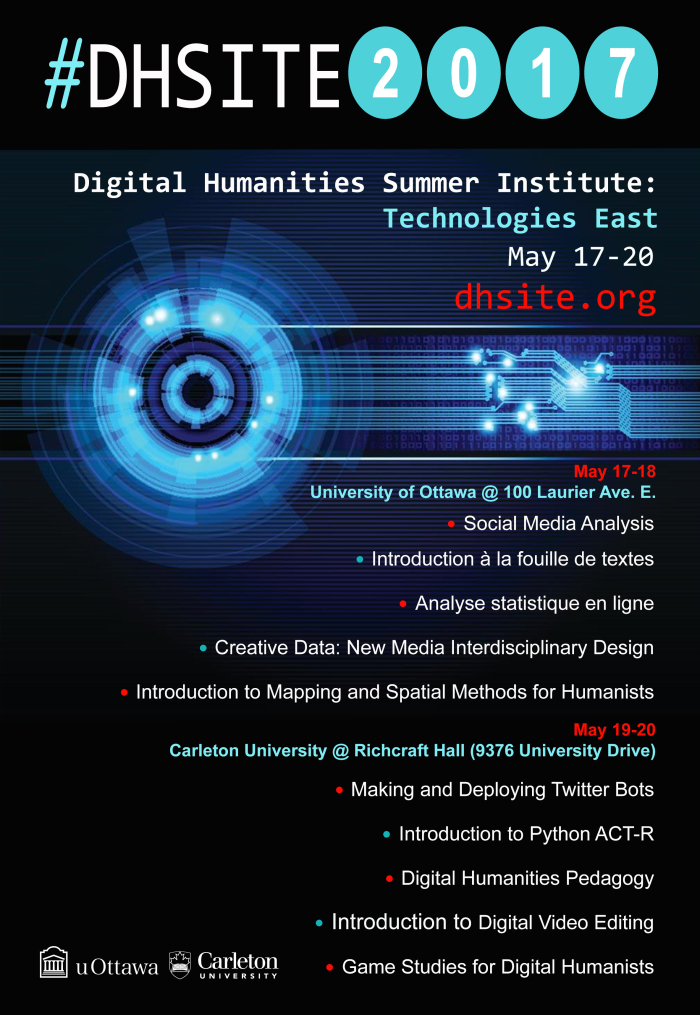Digital Humanities Institute Offers Hands-on Learning
How can an online game enhance our understanding of the French Revolution? How have ebooks changed the nature of reading? Embark on these questions and you’re in the realm of the Digital Humanities — and if you want answers, or at least ways to discover the answers, consider signing up for DHSITE2017.
Digital Humanities Summer Institute: Technologies East is co-hosted by the University of Ottawa on (May 17 and 18) and Carleton University (May 19 and 20), with key support from Carleton’s Global Academy. Featuring practical and theoretical workshops, panels, plenary speakers and presentations, it’s building a buzz beyond the two campuses.
For some, the first question will be “what are the digital humanities?” (or “DH,” in today’s shorthand). In fact, they’re more than just the old humanities — fields such as philosophy, literature, history and music — with a wireless mouse for navigation.
The Digital Humanities Revolution
“We’re at the start of a shift in studying the humanities that’s as revolutionary as the printing press,” says Brian Greenspan, associate professor in Carleton’s English Department and founder of Carleton’s Hyperlab, a DH research centre, who instigated the Carleton side of the co-venture.
“The printing press made texts easier to copy and share and access, which changed the nature of scholarship. However, those changes took years to filter through and take shape. Today, digital tools and technology are making similar seismic shifts to the study of humanities, and it’s important for us to understand those changes and what they mean.
“The heart of the humanities — analysis, inquiry, interpretation — hasn’t changed. But now we have the capacity to run a textual analysis algorithm on 1,000 19thcentury novels simultaneously, and to use software to investigate social and cognitive processes. DH uses these technologies, and it also asks: What are the implications, the benefits and downsides of these tools for our education, our society, our politics and culture.”
As a kind of pop-up institute, DHSITE is an alternative way to enhance students’ learning experience. “Students in our DH undergraduate and graduate programs have been asking for instruction in all kinds of areas that we just don’t have time to cover during the school year,” reports Greenspan, who received a 2017 Teaching Achievement Award from the Office of the Provost for the project. DHSITE will also give DH graduate students teaching opportunities.
Greenspan curated the Carleton program by drawing on colleagues’ innovative work, with workshop topics including Twitter bots, game studies, artificial intelligence and DH pedagogy. A hands-on introduction to digital video editing comes courtesy of a partnership with Carleton’s Media Production Centre.
“We will also include demonstrations of different research initiatives underway at Carleton involving virtual and augmented reality, digital gaming and new narrative media,” says Greenspan. “These are areas in which media are affecting the arts and humanities in visible, tangible ways.”
Keeping Conversations and Partnerships Open
“So much of the research and innovation that goes on in the region — and regionally we’re a hub of innovation — is centred around Carleton, with both current researchers and former students. DHSITE is a prime opportunity to keep those conversations and partnerships going, and to form new partnerships.”
Greenspan and his colleagues hope that this DHSITE is the first of many and that, as the program expands and intensifies, course credits will be offered. “Part of the expansion we want to see,” Greenspan adds, “is greater synergy with the public and private sectors.”
In line with Carleton’s role as a hub that welcomes the Ottawa community, everyone’s invited.
“DHSITE is open to everybody. No knowledge of computer programming is required; if you can surf the Internet and send an email, you’re qualified to join any workshop that interests you. And if you’ve heard of DH and have been wondering how it affects your area of knowledge or expertise, DHSITE is a fantastic place to get your feet wet.”
For the complete program, information and registration, go to dhsite.org.
Workshops Being Offered
University of Ottawa, May 17-18:
- Social Media Analysis
- Introduction à la fouille de textes
- Analyse statique en ligne
- Creative Data: New Media Interdisciplinary Design
- Introduction to Mapping and Spatial Methods for Humanists
Carleton University, May 19-20:
- Making and Deploying Twitter Bots
- Introduction to Python ACT-R
- Digital Humanities Pedagogy
- Introduction to Digital Video Editing
- Game Studies for Digital Humanists
